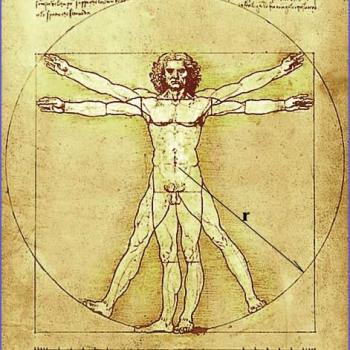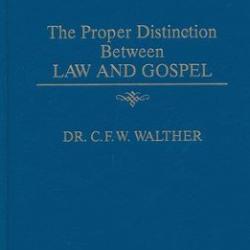
+++
Among professed confessional Lutherans, this, it appears to me, has become an issue.
At the end of my controversial review of Concordia Publishing House’s “So-Called 3rd Use of the Law” book, The Necessary Distinction[i], I made the following statement:
“I know the folks at CPH need to eat, but that is not best done by promoting books that say, for example, that Jesus was justly accused by God’s law (157).”
Here, specifically, is what I was referring to. Naomichi Masaki sums up Luther as follows:
“Christ relates to the law passively. He was born under the Law. He voluntarily… subjected Himself to it in His ministry. This He did so that the Law may rage against Him as much as it does against an accused and condemned sinner, and even more fiercely. The Law accused Jesus of blasphemy and sedition. It found Him guilty before God of all the sins of the world. It frightened Him to the point of the bloody sweat in Gethsemane. Finally, it sentenced Him to death, even to the death on the cross” (157, italics mine)
I’ve been reflecting on this more – Masaki, seemingly echoing Luther, is saying that the law actually accuses Jesus of blasphemy and sedition.

When one looks at some quotes from Luther’s Galatians commentary that relate to this, one might think that it fully explains why Masaki writes as he does.
For example, in the well-known Christian Dogmatics textbook by Francis Pieper (see vol II: 344ff), we find the same passage of Luther mentioned by Masaki, from his famous “Great Galatians” commentary:
“Christ is no longer ‘an innocent and sinless Person, but a sinner who has and bears the sin of Paul, the blasphemer and persecutor, and of Peter, the denier of his Master, and of David, the adulterer and murderer; in a word, He bears and has all the sins of all men in His body…. He Himself is innocent, but since He bears the sins of the world, His innocence is weighed down by the sins and guilt of the whole world. Whatever sins I and you have done have become the sins of Christ, as though He Himself had committed them. Is. 53:6 says: ‘The Lord hath laid upon Him the iniquity of us all.’’ (St. L, IX: 369ff)” (italics mine)
As an online interlocutor put it to me: “the Perfect is ‘weighed down,’ as Luther says, with imperfection. The Sinless has become sinful. In a sense, on the cross Jesus is simul justus et peccator.”

In that same Galatians commentary, speaking of chapter 3, verse 13, Luther writes:
Let us see how Christ was able to gain the victory over our enemies. The sins of the whole world, past, present, and future, fastened themselves upon Christ and condemned Him. But because Christ is God He had an everlasting and unconquerable righteousness. These two, the sin of the world and the righteousness of God, met in a death struggle. Furiously the sin of the world assailed the righteousness of God. Righteousness is immortal and invincible. On the other hand, sin is a mighty tyrant who subdues all men. This tyrant pounces on Christ. But Christ’s righteousness is unconquerable. The result is inevitable. Sin is defeated and righteousness triumphs and reigns forever.
In the same manner was death defeated. Death is emperor of the world. He strikes down kings, princes, all men. He has an idea to destroy all life. But Christ has immortal life, and life immortal gained the victory over death. Through Christ death has lost her sting. Christ is the Death of death.
The curse of God waged a similar battle with the eternal mercy of God in Christ. The curse meant to condemn God’s mercy. But it could not do it because the mercy of God is everlasting. The curse had to give way. If the mercy of God in Christ had lost out, God Himself would have lost out, which, of course, is impossible.
Here, the following questions perhaps arises: is the curse only associated with sin? Or something else? In this regard, his comments on Galatians 4:4 are even more interesting:
How did Christ manage to redeem us? “He was made under the law.” When Christ came He found us all in prison. What did He do about it? Although He was the Lord of the Law, He voluntarily placed Himself under the Law and permitted it to exercise dominion over Him, indeed to accuse and to condemn Him. When the Law takes us into judgment it has a perfect right to do so. “For we are by nature the children of wrath, even as others.” (Eph. 2:3.) Christ, however, “did no sin, neither was guile found in his mouth.” (I Pet. 2:22.) Hence the Law had no jurisdiction over Him. Yet the Law treated this innocent, just, and blessed Lamb of God as cruelly as it treated us. It accused Him of blasphemy and treason. It made Him guilty of the sins of the whole world. It overwhelmed him with such anguish of soul that His sweat was as blood. The Law condemned Him to the shameful death on the Cross.
It is truly amazing that the Law had the effrontery to turn upon its divine Author, and that without a show of right. For its insolence the Law in turn was arraigned before the judgment seat of God and condemned. Christ might have overcome the Law by an exercise of His omnipotent authority over the Law. Instead, He humbled Himself under the Law for and together with them that were under the Law. He gave the Law license to accuse and condemn Him. His present mastery over the Law was obtained by virtue of His Sonship and His substitutionary victory (italics mine).
It almost sounds like, as a Radical Lutheran (a term Gerhard Forde coined) might put it, that God’s Law is a master at getting loose, escaping its chains! What has gotten into God’s “holy and righteous and good” (Apostle Paul) law?

Well, with Luther’s words ringing in our ears, let’s get back to our question. If the law does “justly accuse Jesus”, what makes this accusation just? One might argue that this is exactly what happens when Jesus “becomes sin” for us – the law is going to accuse and condemn Him, and by God’s intention and design. Just as He who has no sin undergoes John’ baptism in solidarity with us, “fulfilling all righteousness,” Jesus so closely identifies with us that He becomes the “real sinner,” so to speak, whose condemnation satisfies the wrath of God the law demands.
Even as, for example, the thief on the cross recognizes that He, truly, is innocent. The spotless Lamb of God.
There is something missing here though. The primary question this brings up is how and why the law accuses Jesus Himself of things like blasphemy and sedition. Does it really do so as the law of God, as it is wielded by the Holy Spirit? (see John 16:7ff).
No.
Why not? Because this is a case of the law being wielded by Satan (who Luther tells us, uses it for our harm and not our good)[ii], but Satan getting played by God.

Here is how it works: God, being of perfect character, is the definition of justice. Therefore, if He chooses, from the foundation of the world, for His Son to be slain by sin and evil – something the Son Himself ultimately is determined to have occur – in order to die in our place, “blow up” death and the curse, and win back His creation, then it is, by definition, “just”. Satan’s plan gets co-opted and used in the bigger plan of the One who “works all in all.” Jesus therefore, in spite of being unjustly accused by the law as wielded by Satan, is, in this sense “justly accused.” He becomes sin for us so that God’s justice (broader sense of the term – which includes mercy) – which even uses evil for good! – prevails. Even Jesus Himself, as our Great High Priest offering Himself for us as sacrifice, can say “No one takes [my life] from me, but I lay it down of my own accord. I have authority to lay it down and authority to take it up again. This command I received from my Father.”
In other words, the answer to the question “Was Jesus than “justly accused by God’s law?” is “Perhaps, but only in a very limited sense.” (the one above)
That said, I still do not think we should say that “Jesus was justly accused by God’s law,” as it is more liable to confuse than anything else – “Are you saying Christ actually broke the law?” — and to be hijacked by others for nefarious purposes.[iii]
Which brings me back to Masaki’s essay. You might be thinking, “this is not specifically what Masaki said anyways (justly accused), so why did I have that in my original review? Was it fair of you to say that?” The reason I said that is because other statements made by him, covered in that review, indicate he follows Gerhard Forde in his belief that most all theologians outside of Luther have considered “the Law,” and not God’s gracious favor, “as the original way of salvation.” Therefore, “[f]or Luther,” he explains, “the Law was not a description of what man is supposed to do within the structure of the eternal order. Instead, he viewed the Law as what it actually does. It kills” (The Necessary Distinction, 153-154). Forde explicitly draws the logical conclusion: Jesus Christ, in spite of His perfect life traditionally understood to have been in complete accordance with God’s law “was quite justly condemned by the law” (Forde, Theology is for Proclamation, 77).

“Justly condemned by the law.” Even though I am unfamiliar with this line of thinking being present anywhere in the church’s history, persons sympathetic or somewhat sympathetic to Forde have expounded on thoughts like this – and not in the way I unpacked it above. Rather, they might say, for example, that in the end Jesus was justly accused as a violator of God’s own law so that all sinners may have assurance of eternal life. In violating the law, Jesus Christ is actually being faithful to his Father’s mission to save the ‘lost sheep of the house of Israel’ (Matt 10:6). Here, Jesus presumably breaks the Law by, for example, dining with sinners![iv] Another — not Benny Hinn or Kenneth Copeland — has even appeared to say that Christ committed His own, personal sin by not believing the Word of God (when He was on the cross): “He felt God’s wrath and took that experience as something truer than God’s own word of promise to him.”[v]
In sum, what it comes down to is this: Christ ends up a damned sinner, “defeated” by that most coercive and even killing of forces: the merciless “order keeping” law!
What do I mean?
By “order keeping” I mean something like this: law is not necessarily associated first and foremost – or at all! — with God’s law, the 10 commandments, but is rather anything which provides boundaries, “makes life work,” and keeps peace – all good things! What really is true, right, and just may not even need to be considered here, as this story from a good friend of mine illustrates:
“In Kindergarten I was accused of and punished for throwing a snowball at recess. I had not done it. Oddly enough, 45 years later, it still kind of hurts to think about.
In other words, even though I was not guilty of the sin for which I was punished, there was significant suffering involved on my part. I didn’t need to be the sinner to suffer for the sin of whoever did commit that sin. Although that is what I, for all intents and purposes, became.
And justice was served. The boy hit by the snowball in the face, and his parents, were satisfied. The teacher and principal upheld the law. My classmates learned from my experience.”
By “merciless,” I mean that the law, though “good” in an earthly sense, ultimately fails because it does not have the good of particular persons in mind – even Jesus!
This, however, is mistaken. Why? Luther believed that the law, in its proper use (see footnote 2 as well), always went hand in hand with truth and the Holy Spirit – and that God convicted by it with the intent to deliver the faith-creating Gospel. Lutherans used to talk about this all the time, as John 16:7ff was used repeatedly by the original Reformers. This is why Luther could talk about the law in a way you generally won’t hear from persons attracted to Forde (and certainly not from Forde himself!): “The law does not want you to despair of God,” he said, rather “it wills that you despair of yourself, but expect good from God…”

Yes, since we are sinners and remain so until heaven, the good law can’t not accuse and condemn us. That said, from the beginning, the law was not given to threaten, accuse, and terrify us, but rather to inform us of danger and guide us in truth.
Again, the only response to the idea that Christ ends up being a damned sinner according to God’s law is that this is a perversion of the truth that will not do. As the Apostle Paul would have put it: “Anathema!” As another one (this one) put it, “Jesus knew that God knew that Jesus was innocent.” Therefore, Jesus willingly accepts the punishment – the wrath! – we deserved as He bore our sins on the cross.
When Luther, for example, comments on Psalm 51, he writes that
“[T]hat expression, ‘My God, why have You forsaken Me?’ is similar to blasphemy against God, but it is not blasphemy. If, therefore, we were to say that Christ had been made the blasphemy of God, as some translate that passage from Deuteronomy (21:23), ‘he who is hanged is a blasphemy of God,’ or, ‘he who is hanged is an insult of God,’ of which Jerome makes much in his treatment of Galatians, then we would say it in the same sense as that statement (Gal. 3:13), ‘He was made a curse and sin,’ that He felt the blasphemy, the curse, the sin in Himself without the blasphemy, without the curse, without the sin which, in us, was a blasphemy that blasphemes, a curse that curses, a sin that sins. To such an extent was Christ plunged into all that is ours, as it says in Ps. 69:10 and Rom. 15:3, ‘The insults of those who insult you fell upon Me’” (italics mine).
…those with eyes to see can tell that is not the same thing as claiming that, by the law’s judgment (is the law, properly used, in accordance with truth or not? – see footnote 2), Jesus took His experience of God’s wrath as “something truer than God’s own word of promise to him.”

Luther also writes “For even in His own eyes, Christ was similar to one who has been forsaken, to one who has been cursed, to a sinner, a blasphemer, one who is condemned, and yet without sins or guilt.” If this is indeed the way to understand Christ’ cry of dereliction, there is, contra Gerhard Forde, no good reason to think that Christ had not, in fact, experienced His Father’s turning away, and thereby let His suffering humanity be known to Him (whom He never ceased to look to in trust!). Is God not holy? Indeed, does He not refuse to abide that which is not? Particularly when all that is not holy has been concentrated in one [very human, very created,] place?
And yet, sin and death — and their judgment in Him — could not hold the God-Man. Perhaps, remembering not just the beginning of Psalm 22 (“My God, my God, why….”) but its glorious end as well, our Lord ultimately cries out “It is finished!” and then, “Into your hands, I commend My Spirit.” He does not despair of God, but expects good from Him, fulfilling the law.
In sum, Christ never violates God’s law, which some today, misinterpreting Romans 10:4, believe absolutely had to go – not just in the sense of accusation, but totally. This is wrong.

I close with the following point from Dr. Eric Phillips:
“To call Christ a sinner, and to treat Him as such, is to number Him with sinners. To call Christ sin is to call Him a sin offering, because this is how the OT sacrifices consistently speak of it (“sin offering” is simply the word “sin”).
To say the least, this is a great mystery! Brothers, from the bottom of my heart, I say this: Let’s remember who we are dealing with… let us trust the Word of God, delivered to us in the Scriptures!
FIN
Notes
[i] Also discussed on Federalist writer Matthew Garnett’s “In Layman’s Terms” podcast here and here. Part 3 available this weekend.
[ii] Would this be using the law properly? After all, nowhere are we told in Scripture that Christ commits any sinful action. He is fully without sin, even as, per God’s eternal plan, our sin is imputed to Him. Note also that when Luther talked about law being administered on earth, his understanding of it law is hardly a “wooden” one but is considerably nuanced: that “[A]ll laws that regulate men’s actions must be subject to justice [Billicheit], their mistress, because of the innumerable and varied circumstances which no one can anticipate or set down.” (LW 46:103; WA 19:632) and that when it comes to law, good decisions are made “as though there were no books.” “Such a free decision is given, however, by love and natural law, with which all reason is filled ; out of books come extravagant and untenable judgments” (LW 45:128 ; WA 11:279). (see here for more). If earthly rulers are to be so careful in their judgements with the law, how much more so God in heaven? (and to point out such a thing is not to say that the law does not also, before God, cause every mouth to be silent, revealing as it does the guilt of all.)
[iii] Having read the text which precedes this footnote, Pastor Eric Phillips, I think, aptly sums up what is at stake in this question:
“For the accusation to accomplish justice (whether the wide or narrow sense of “righteousness”), and for it to be just in itself, are two different things. The former concerns the end and the latter the means. This is a case (the prime case) of justice being accomplished by unjust means, of good coming from evil, because the one who was called upon to suffer that injustice willingly did so instead of insisting on His rights, and offered His suffering for the sin of the world.
To say that the law accused Jesus justly is to confuse the end with the means.
It also demonstrates the danger of talking about the Law as if it were a person, when it’s not. Who used the Law to accuse Jesus? It was “him that had the power of death, that is, the devil.” The Father bruised the Son by using the devil, not by using the Law. And as the devil wielded the Law, it was unjust.”
Therefore, when Luther writes colorfully about the law in the quotes above in the main text, giving this “force” personality, are we to believe that this is more than creative rhetoric? That he is to be taken literally here, and that he honestly thinks that the law by itself has a personality of sorts? Or that it is operating properly, as it is designed to be used?
[iv] This author goes on to talk about how in Jesus Christ’s ministry, everyone excluded by the law (tax collectors, prostitutes, prodigals, etc) would be embraced by God. It is for that particular reason that the very Son of God is shunned and killed on the cross. Here the law, even in those with good but self-justifying intentions, overcomes God’s promise in Christ alone. The law must therefore have its limits — and even its end! (Rom. 10:4)
[v] Another statement: “[Jesus was] multiplying sin in himself just like any other original sinner who does not trust a promise from God.” This has to do with Christ’s cry of dereliction from the cross: “My God, my God, why have you forsaken me?” Presumably, we are to understand here that God, did not, in fact, turn away from Jesus at this moment, prompting His cry. Rather, because of the weight of the sins of the world He bore, Christ irrationally confessed our sins by believing that His Father was displeased with Him and thereby sinned all of our sins. In other words, Christ’s willful act of ‘confessio’ is what makes Him truly a sinner who disobeys according to the law, which is to be sharply distinguished from God’s will. For example, in other statements this author says: “[Jesus] wants to take your sins and leave it to no one else; so he sins against the Golden Rule,” that when Jesus took sin by association, he not only transgressed the law, but placed himself ‘under an evil lord.'” More: “If Christ were obedient to the law, rather than obedient to the Father…” and “Christ’s obedience is outside the law, since the Father is not the law.” If this author believes and means to say that “ontologically Christ didn’t sin,” or something like this, then the logical thing to conclude is that God’s use of His own law is, to say the least, wooden (e.g., “Here Paul’s point is exact: the law is no respecter of persons, it does not identify Christ among sinners as an exception to the rule. Law as “blind lady justice” executes its judgment regardless of race, color, creed—or divinity.” [!]) and that it is not in accordance with what is really good, right and true, correct? This,, however, is the opposite of what Luther believes. The great reformer not only notes how “the Spirit first convicts the world of sin in order to teach faith in Christ, that is, the remission of sins (John 16:8)” (SDEA 37), going on to speak about how Adam, David, and Paul are killed by the law. He also says that, in accordance with God’s will, the law does not do its work without God’s Holy Spirit, who gives “all truth, wherever it might be,” for “to forbid the law is to forbid the truth of God” (SDEA 139 ; see also 55).
Luther does speak about the importance of metaphorical and figurative language. For example, he writes vs. Latomus: “So, coming to the point of this discussion, we see that when Christ is offered up, he is made sin for us metaphorically, for he was in every respect like a sinner. He was condemned, abandoned, put to shame, and in nothing different from a true sinner, except that he had not done the sin and guilt which he bore” (LW 32:200). Luther goes on, “In this trope there is a metaphor not only in the words, but also in the actuality, for our sins have truly been taken from us and placed upon him, so that everyone who believes on him really has no sins, because they have been transferred to Christ and swallowed up by him, for they no longer condemn. Just as figurative language is sweeter and more effective than is crude and simple speech, so also real sin is burdensome and intolerable to us, while transferred and metaphorical sin is wholesome and most delightful” (LW 32:200). Thus, “We therefore say that the sophists really do not know what sin is according to the usage of Scripture, for when they talk of ‘penalty’ they dream in an unscriptural way of something very different from sin. As I said, Christ was in every respect similar to sin except that he did not sin, for all the evil which follows sinful acts in us, such as the fear of death and hell, was felt and borne by Christ. The sophists themselves do not understand what they have invented about guilt and the attribution of punishment. Contrary to what they say, Christ felt that attribution, and was similar to one to whom sin is attributed, although without guilt. What is an attribution which one does not feel? Absolutely nothing. So, as I said, Christ differs not at all from a sinner of our own day who has just received the sentence that he must be condemned to death and hell. It was an effective attribution, wholly genuine, except that he did not deserve it, and was delivered up for us without having done anything to merit it. However, this is a thing rather to be experienced than to be discussed and grasped in words” (LW 32:202).
Still, does this not seem to be a far cry from the words in the previous paragraph? See Pastor Cooper’s post on this topic from the other day as well.












